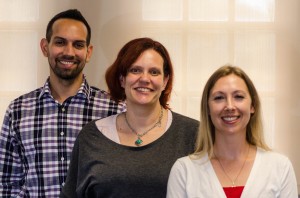WKPIC welcomes our new doctoral interns, John Torres, Rain Blohm, and Crystal Bray! You’ll be hearing from them soon.

WKPIC welcomes our new doctoral interns, John Torres, Rain Blohm, and Crystal Bray! You’ll be hearing from them soon.

Summer ends, and so, too, does a year of internship at WKPIC. Good luck to Dr. Brittany Best, Dr. Graham Martin, and Dr. Faisal Roberts. Dr. Best moves on to a post-doctoral year in Hawaii (yes, we are all jealous), Dr. Martin is returning to his home state of Texas for his post-doctoral position, and Dr. Roberts is headed off to Pennsylvania for his post-doctoral year.
WKPIC staff knows you’ll do well wherever you go. We’re very proud of your accomplishments here–and no doubt we will hear good things about you in the future.
Research is demonstrating that stress can be contagious across various populations. In a study completed by Waters, West, and Mendes (2014) results indicate that babies quickly pick up their mother’s stress and show corresponding physiological (cardiac) changes. West et al. (2014) findings demonstrate that emotions may be communicated through a variety of channels, such as odor, vocal tension, facial expression, or touch. This leads to questions of whether these findings are applicable to adults or among strangers? Can stress still be contagious beyond the intimate bond of mother and child?
Findings from Engert, Plessow, Miller, Kirschbaum, and Singer (2014) show that observing others in a stressful situation can make your body release the stress hormone cortisol. The results show that being around a loved one or a stranger that is stressed results in quantifiable stress reactions. This study involved having subjects paired with loved ones and strangers of the opposite sex, and then divided participants into two groups. One group underwent challenging math questions and an interview to emulate a stressful situation, whereas the other group of 211 participants observed the test. Only 5% of the participants that were involved in the stressful situation remained calm, while the other 95% showed signs of stress. Interestingly, 26% of observers had increased cortisol indicating empathetic stress. When directly observed, empathetic stressed increased significantly when the observer watched a loved-one experience stress. Additionally, empathetic stress increased when observers watched a stranger in a stressful situation via video transmission.
Overall, stress is a major health threat in today’s society; even still, the likelihood of coming into contact with stressed individuals is also prominent (Max-Planck-Gesellschaft, 2014). Thus understanding the impact of stress and empathetic stress is important for developing prevention and/or intervention strategies. As Engert et al. (2014) suggest, we should be cautious of watching or observing stressful shows or other stimuli, as this may transmit stress to the viewers (Max-Planck-Gesellschaft, 2014). Also, the results of the study show that emotional closeness is a facilitator but not necessary to the experience of empathetic stress. Respective of these studies, the authors conclude “stress has enormous contagion potential” (Max-Planck-Gesellschaft, 2014).
References
Engert, V., Plessow, F., Miller, R., Kirschbaum, C., & Singer, T. (2014). Cortisol Increase in empathic stress is modulated by social closeness and observation modality. Psychoneuroendocrinology, 45, 192-201. DOI: 10.1016/j.psyneuen.2014.04.005
Waters, S. F., West, T. V., & Mendes, W. B. (2014). Stress contagion: Physiological covariation between mothers and infants. Psychological Science, 25(4), 934-942. doi: 10.1177/0956797613518352
Max-Planck-Gesellschaft. (2014). Your stress is my stress. Retrieved from http://www.mpg.de/research/stress-empathy
Dannie S. Harris, M.A., M.A., M.A.Ed., Ed.S.
WKPIC Practicum Trainee
WKPIC has been proud to host and teach excellent young psychologists for almost 20 years. As we begin our new adventure as an APA-Accredited internship, we have had the pleasure of reconnecting with and checking in with previous classes, and applauding their success in the working world.
So, where are our former interns?
Everywhere!
2013-2014
Dr. David Wright
Medical officer in U.S. Army at Killeen, TX
Dr. Danielle McNeill
Post-Doctoral Psychologist at Western State Hospital, Hopkinsville, KY
Dr. Cindy Geil
Post-Doctoral Psychologist at Pennyroyal Center, Hopkinsville KY
2012-2013
Dr. Sirrena Piercy
Clinical Psychologist at Wabash Valley Alliance Inc in Frankfort, Indiana
Dr. Margarita Lorence
Post-Doctoral Psychologist at Fulton State Hospital, Missouri
2011-2012
Dr. Sam Miller
Owner/operator Miller Wellness, Bowling Green, KY.
2010-2011
Dr. Zach Meny
Regional Clinic Coordinator, Pennyroyal Center, Hopkinsville, KY
And of course, Training Director for WKPIC!
Dr. Laura Boggs
Clinical Psychologist at Health Associates & at Dockside Services, Indianapolis, IN.
If you’re a former intern of WKPIC and would like to let us know where you are and what you’re doing, send us a message! We’d love to celebrate on your behalf.